
Celaenorrhinus ambareesa, commonly known as the Malabar spotted flat, is a species of hesperiid butterfly found in India.
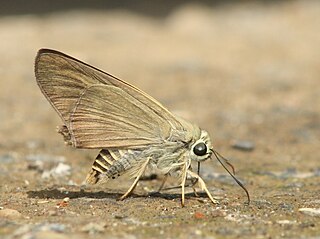
Badamia exclamationis, commonly known as the brown awl or narrow-winged awl, is a butterfly belonging to the family Hesperiidae. It is found in south and southeast Asia, Australia, and Oceania.

Hasora badra, the common awl, is a butterfly belonging to the family Hesperiidae, which is found in India.

Hasora chromus, the common banded awl, is a butterfly belonging to the family Hesperiidae which is found in the Indian subcontinent, Southeast Asia and Australia.
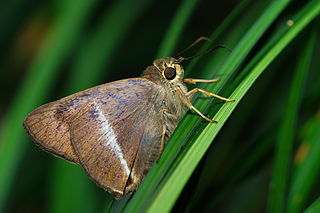
Hasora taminatus, the white banded awl, is a butterfly belonging to the family Hesperiidae, which is found in Asia.
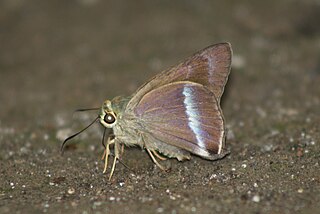
Hasora vitta, the plain banded awl, is a butterfly belonging to the family Hesperiidae which is found in India and parts of Southeast Asia.
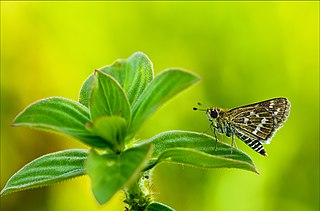
Taractrocera maevius, the common grass dart, is a butterfly belonging to the family Hesperiidae found in India, Sri Lanka and Myanmar.

Celaenorrhinus leucocera, commonly known as the common spotted flat, is a species of butterfly belonging to the family Hesperiidae. It is a common butterfly generally found in the wet forested hills of southern Asia, from India and the Himalayas east through Indo-China. The upper surfaces of the wings are dark brown with white bands and small white spots towards the tip of the wings.
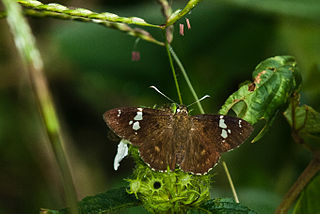
Celaenorrhinus ruficornis, commonly known as the Tamil spotted flat, is a species of butterfly belonging to the family Hesperiidae which is found in India, Java, and the Sulawesi Region.

Sarangesa purendra, commonly known as the spotted small flat, is a species of butterfly in the family Hesperiidae.

Spialia galba, the Indian grizzled skipper, is a hesperiid butterfly which is found in South Asia and parts of Southeast Asia.
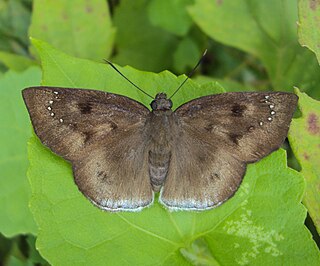
Tagiades gana, the immaculate snow flat, large snow flat or suffused snow flat, is a butterfly belonging to the family Hesperiidae found in Indomalayan realm.

Eurema blanda, the three-spot grass yellow, is a small butterfly of the family Pieridae which is found in Sri Lanka, India and southeast Asia.

Appias indra, the plain puffin, is a small butterfly of the family Pieridae, that is, the yellows and whites, which is found in south and southeast Asia.

Colias berylla, the Everest clouded yellow, is a small butterfly of the family Pieridae, that is, the yellows and whites, which is found in Sikkim (India) and Tibet.

Bindahara phocides, the plane, is a small butterfly found Indomalayan and Australasian realms that belongs to the lycaenids or blues family.

Chilades parrhasius, the small Cupid, is a small butterfly that belongs to the lycaenids or blues family. It is found in Nepal,southern Turan, southern Ghissar, Iran, Afghanistan, Pakistan, Sri Lanka and southern, central and north-west India.

Lampides boeticus, the pea blue, or long-tailed blue, is a small butterfly that belongs to the lycaenids or gossamer-winged family.

Hasora anura, the slate awl, is a species of hesperid butterfly found in Asia. In India it is found in Sikkim and the Khasi Hills.

Apporasa is a genus of butterflies in the family Lycaenidae, the blues. The genus is monotypic containing only Apporasa atkinsoni, the crenulate oakblue. It is found in the Indomalayan realm.





















